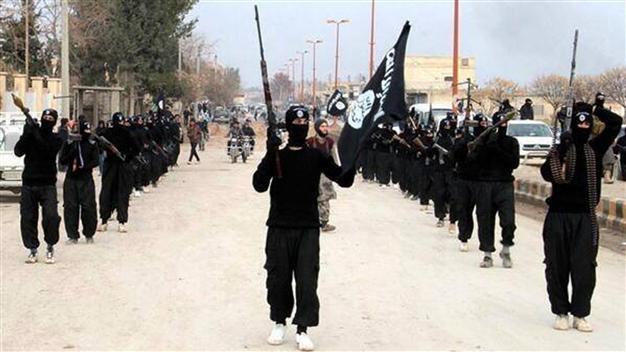More than 1,000 Turks fighting for the Islamic Caliphate
Serkan Demirtaş

This undated file image posted on a militant website on Tuesday, Jan 14 which has been verified and is consistent with other AP reporting, shows fighters from the al-Qaida linked Islamic State of Iraq and the Levant (ISIL) marching in Raqqa. AP Photo
The number of Turkish citizens fighting under the umbrella of the Islamic State of Iraq and the Levant (ISIL) is slightly more than 1,000, according to Turkish officials, who admit that they are unable to learn the exact number. The estimated number of armed ISIL fighters is around 12,000 to 15,000, which shows that Turks make up just less than 10 percent of the jihadist group.Turkey has long been accused of not efficiently controlling its borders to prevent those foreigners joining the jihadist extremist groups and stop the flow of weapons into Syria. In response to these criticisms, Turkish officials have noted the difficulty of controlling a nearly 900-kilometer-long border while blaming Western countries for not sharing intelligence on potential recruits for the jihadist groups.
However, when it comes to Turkish citizens’ participation in one of the world’s deadliest groups, these explanations are unconvincing. Who organized the recruitment of these people for ISIL? What organizations sponsored these recruitments? Which routes have been used? Assuming the security forces and the intelligence are closely following the jihadist movements in Turkey, how did they fail to realize that more than 1,000 Turks have joined ISIL? Could it be because security forces and intelligence skipped their main duties and responsibilities as they are chasing what the government calls the “parallel state”?
Whatever the answers to these questions are, there is one absolute reality: Turkey is facing the danger of the jihadist structure, both inside and outside. In Iraq, 49 Turkish citizens have been in ISIL captivity since early June. Due to the sensitivity of the issue, mainstream media does not frequently write on the issue, but one thing is certain: Somebody will have to answer some very disturbing questions once our citizens, including Turkey’s consul general in Mosul, return home safe.
Inside Turkey, there is enough evidence to get concerned about increasing extremism. First, we have seen some Sunni groups attacking a mosque belonging to the Caferis, a branch of Shiite Islam. With ISIL making new advances, their sympathizers have become more visible in a bid to display their contentment with the developments. It was on July 31 when the Hürriyet Daily News reported about an Istanbul-based Islamic charity organization that had to suspend its activities after it was criticized for using an insignia adopted by the ISIL.
There were also allegations that the charity was recruiting militants for the fight in Syria and Iraq.
In separate news, Turkish media broadcast a few days ago pictures of hundreds of men with long beards in Taliban-style dress gathering for Eid al-Fitr somewhere in Istanbul. The group was allegedly linked with ISIL, and they dedicated their Eid al-Fitr prayers to ISIL fighters in Iraq and Syria.
Another development that has boosted the public showcase of these jihadist groups is the Israeli attack on the Palestinians. Israeli brutality deserves all sorts of reactions, but demonstrations staged by groups, especially in Ankara and Istanbul soon became violent. These are obviously the best moments for such groups to gain more supporters in society and reach out to different segments of the society. The government has the full responsibility to keep these demonstrations in check without causing any unwanted, irreparable incident.
Before it is too late, the intelligence and security forces must be on full alert to stop the growth of these jihadist groups, recruitment to ISIL or other terrorist organizations, while the government should issue strong statements that it won’t tolerate these inclinations in a multi-ethnic, multi-religious and multi-sect society.











